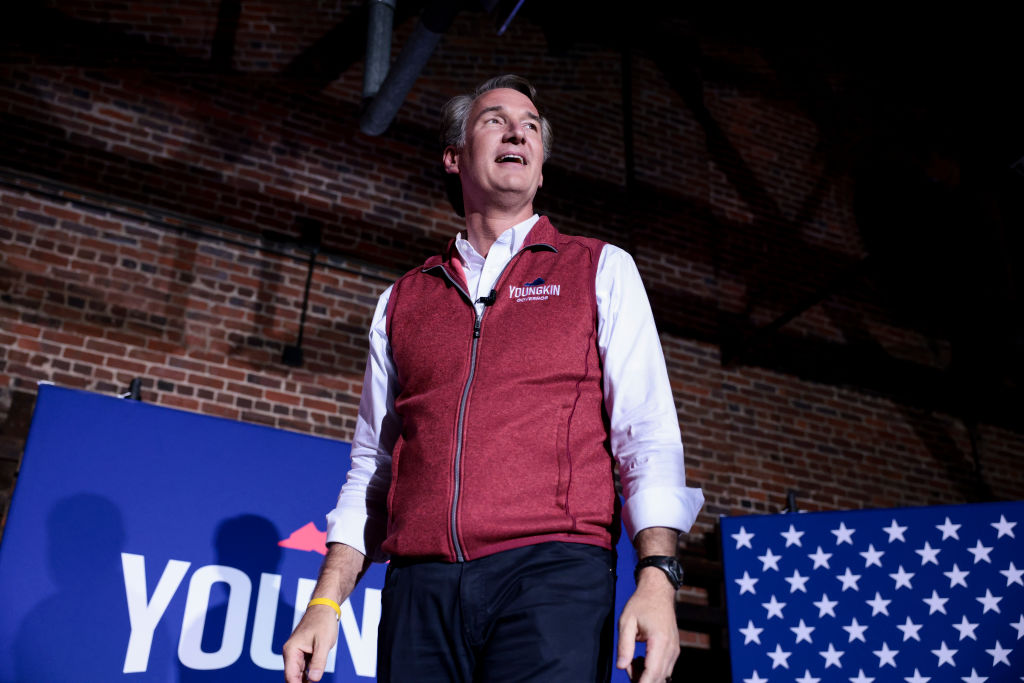How is the mood in Virginia these days? It appears to be a bit litigious.
Last month, seven school boards announced they were suing Republican Governor Glenn Youngkin over his executive order banning mask mandates in schools. The ACLU is also suing Youngkin over the order, despite the fact that it used to sue to protect liberties, not infringe on them. Youngkin, meanwhile, is suing the Loudoun County School Board, which is also being sued by parents incensed over its mask policies as well as all of its other policies.
Cut to me sitting in my Alexandria apartment terrified that a lawyer is about to knock at the door. Certainly a blizzard of lawsuits is nothing extraordinary in modern-day America — or many other powerful nations for that matter. All the way back in the 5th century BC, the playwright Aristophanes was mocking Athens for its culture of litigation. It may be that comfortable peoples with open court systems just really like to sue each other.
What’s makes Virginia’s legal onslaught curious is that Republicans have gotten involved. Wind back the clock a couple decades and lawsuits were viewed with suspicion by many on the right. Tort reform and malpractice reform were staples of any GOP platform — it was easy to understand why. The judicial system back then was dominated by powerful left-wing attorney lobbies and feminist superlawyers like Gloria Allred. Adversarial Supreme Court decisions still stung, from Roe v. Wade to civil liberties cases that defanged the Bush administration’s war powers.
Yet today, lawsuits have become a sharp tool in the conservative chest. What’s changed?
For one, Republicans wield more power over the judicial system than they used to. Roe sparked a movement on the right to field friendly legal thinkers and get them onto the bench. These efforts found a powerful ally in Senate Majority Leader Mitch McConnell, who, though a careful tactician, was willing to wage procedural (and possibly literal) nuclear war to get good judges through Congress. Cut to today, when six out of the nine Supreme Court justices were appointed by GOP presidents, along with 94 out of 179 appeals court judges and just under half of district court judges. Donald Trump alone has seated more than a quarter of the federal bench.
Yet while the right has made inroads into the courts, they’ve also become increasingly alienated from other institutions like universities, the education establishment, and legacy news outlets. This sense of persecution at the hands of an imperialistic left has molded a conservative politics that cares less about ironclad principle (i.e. stop suing your neighbor) and more about institutional counterattack (i.e. sue your neighbor because we own the courts and he’s a BLM fanatic who just reported you to the local homeowner’s association). This new approach has ironically tapped into old arguments, which hold that courts are a fundamentally conservative force, shielded from the fashionable radicalisms of the day.
This brings us back to Youngkin. The man who campaigned in a fleece vest has apparently traded it in for a Kevlar. Youngkin hasn’t just taken the mask fetishists to court; he’s established a tip line so parents can report woke teachers to the government. He’s banned the instruction of critical race theory, opened an investigation into the clown-car Loudoun County school board, and replaced the state’s “equity” office with an emphasis on opportunity and protecting the unborn, then appointed as its head a former Heritage Foundation exec.
He’s blazed through left-wing shibboleths with surprising speed — and progressives have noticed. Recently, at a grocery store in Northern Virginia, Youngkin was accosted by a shopper for not wearing a mask. “You’re in Alexandria!” the woman shouted. “Read the room, buddy!” (Given that “reading the room” in Alexandria means double-masking outdoors while walking a rodent-sized dog that’s also double-masked, I think Youngkin’s optics are going to be okay.)
Youngkin is no Nelson Rockefeller, no creature from the Carlyle Group sent to wreak havoc on the estate tax and exactly nothing else. The Virginia governor is, in fact, a herald of the new post-Trump conservatism. This conservatism doesn’t need Trump per se. It doesn’t buy into some of the seedier conspiracy theories and vanity projects of his presidency. But it is determined to fight this institutional war with every stone it can grab. That means lawsuits and executive orders, concerns about torts and legislative primacy respectively be damned.
There is a risk to this kind of populism (beyond just that tort reform and legislative primacy are good ideas). It is that the leader acts largely for show, that he rallies the people with visceral yet empty gestures while ultimately achieving very little. Executive orders can be canceled by future governors, after all, while it’s difficult to imagine an anti-teacher tip line sorting out the valid grievances from the invalid ones.
We’ll see what Youngkin is able to do with his mandated single term of four years. But at least for now, it looks like the woman in Alexandria got it wrong, like Youngkin has actually read the room quite well.


















